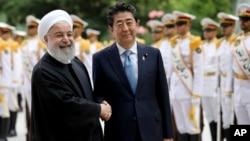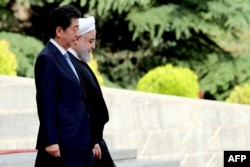Katherine Ahn of VOA's Persian Service contributed from Washington.
Japanese Prime Minister Shinzo Abe warned of another military conflict in the Middle East if the global community is not more patient in the quest to ease escalating tensions between the United States and Iran.
Abe arrived in Tehran on Wednesday, on a diplomatic mission to ease hostilities between the two countries that are fueling concerns of another conflict in the region.
After meeting with President Hassan Rouhani on Wednesday, the two leaders held a joint news conference at which Abe urged world leaders to have "more patience" or face the "possibility of an accidental conflict" that "should be prevented at all costs."
Asked about Abe's meeting with Rouhani on Wednesday, State Department spokesperson Morgan Ortagus said she is confident the U.S., Japan, Germany and other European allies are all delivering the same message to Tehran to not develop nuclear weapons or engage in destabilizing activities in the Middle East.
"We believe that we are in full agreement and in full alignment with our allies," Ortagus said, adding, "whatever the Japanese Prime Minister is able to do, we are, of course, supportive of anyone."
She said President Donald Trump met recently with Abe and will meet with him again soon.
Abe also called on Tehran to play a key role in the effort to secure peace. "It is essential for Iran to play a constructive role in strengthening peace and stability in the Middle East," he said.
Rouhani told reporters Iran is not seeking war with the U.S. but warned it would deliver "a crushing response" if it is attacked.
Rouhani also said Japan was willing to resume buying Iranian oil after Tokyo stopped doing so to comply with U.S. sanctions. "Whenever the economic war stops, we will see a very positive development in the region and the world," he said.
"Japan has for many years tried to show that it can retain good relations with Iran, as well as the United States, which is a very delicate balancing act," said Patrick Clawson, research director for the Washington Institute for Near East Policy, in a Wednesday interview with VOA Persian. "Japan would like to ensure that Iran does not see it as being hostile, in spite of Japanese companies cooperating with the U.S. sanctions on Iran."
But Clawson also said Japan is able to manage without Iranian oil imports because global oil markets are well-supplied, and oil prices have remained relatively low.
Abe is the first Japanese leader to visit Iran since its 1979 Islamic Revolution. After meeting with Rouhani, Abe was to meet Thursday with Supreme Leader Ayatollah Ali Khamenei.
Abe's two-day visit marks the highest-level effort to date to de-escalate U.S.-Iran tensions. They heightened in recent weeks, one year after the U.S. withdrew from a 2015 accord between Iran and world powers to curb Tehran's nuclear program in exchange for the lifting of sanctions.
The U.S. considers the agreement flawed and is trying to force Iran into new talks after reimposing crippling oil sanctions against the Islamic Republic and initiating a military buildup in the Persian Gulf region.
Iran responded in May with threats to resume an uranium enrichment program unless the other world powers that signed the accord protect Iran's oil and banking industries from the sanctions.
Japanese officials said Abe would not make demands on Tehran or deliver a message from Washington, but would instead act as a neutral intermediary.
During a visit to Japan last month, U.S. President Donald Trump welcomed Abe's help in dealing with Iran, which has good diplomatic relations with Japan.
A Japanese government spokesman said Abe and Trump discussed "the situation in Iran" during a Tuesday telephone call.






